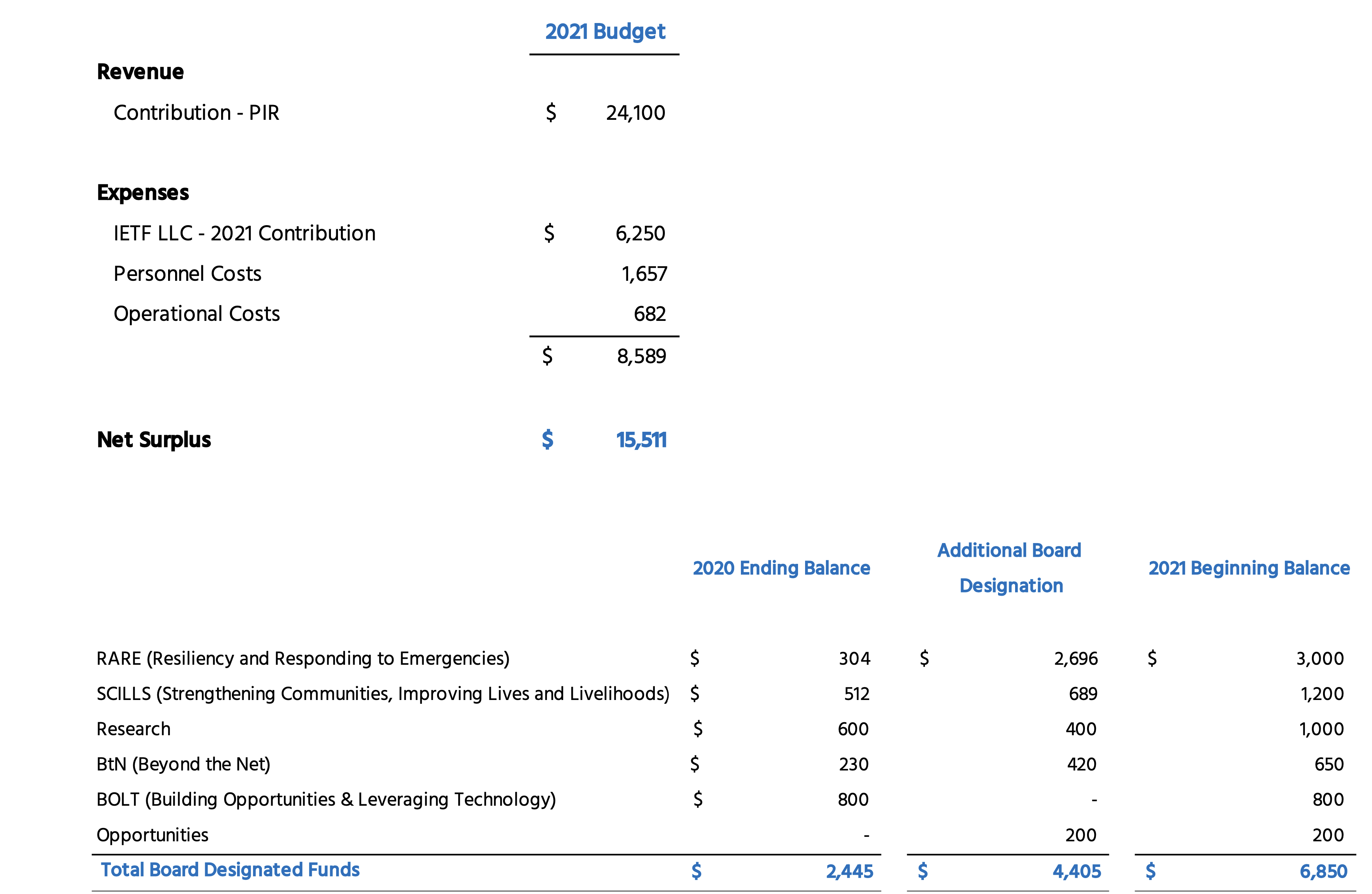Introduction
The Internet Society Foundation (the Foundation) was launched by the Internet Society in 2019 to extend the reach of its mission through philanthropy. Specifically, the Foundation was established to invest in non-profit organizations and individuals, as well as the Internet Society Chapters and Special Interest Groups (SIGs), all of which are dedicated to providing meaningful access to an open, globally connected, secure and trusted Internet for everyone.
In addition to awarding funds to Internet Society Chapters and SIGs, four programme areas were identified to consider as possible investments: Capacity Building, Research, Innovation and Disaster. According to studies conducted on behalf of the Internet Society by the consulting firm Bridgespan, these four areas had investment gaps wherein the Foundation could make a significant, positive impact in the development of the Internet as: a global technical infrastructure, a resource to enrich people’s lives, and a force for good in society.
In keeping with the Bridgespan recommendations, the Foundation committed to action and launched its first programmes. To support this activity, our operations and organizational capacity functions were developed in 2019 and 2020 to ensure we were established to manage this critical portfolio.
The COVID-19 pandemic is now a backdrop that dramatically underscores the critical need for an Internet for all. In 2021, the Foundation therefore plans to expand our investments by launching the remaining programmes in our portfolio and by working toward the sustainable impact of our existing programmes. Anchored in philanthropy, we will do this by:
- Investing in people and organizations whose work utilizes the Internet to help populations.
- Developing programmes that address identified, critical needs.
- Partnering with other organizations that seek positive change.
- Discovering new and exciting opportunities that push the limits of ideas.
- Creating a community among grantees.
- Evaluating our portfolio's impact and adapting to lessons learned.
Our Core Values
The Foundation presents here our values to reinforce our commitment to transparency and accountability:
- We are bold. We are unafraid to take on new challenges, seek unique solutions, and blaze our own trail.
- We act with integrity. We do what is right even when it is not easy, hold ourselves and others to a high standard, and choose honesty above all else.
- We are committed. We prioritize our grantees’ success and sustainability, our team members’ well-being and growth, and making a true difference for people and the planet.
- We are inclusive. We seek out worldwide opportunities to advance ideas and we foster strength in diversity.
Our 2020 Successes
In 2020, the Foundation implemented the strategy presented in the 2020 Action Plan:
- Introduce and amplify the Foundation brand by communicating the role and scope of the Foundation’s purpose and focus.
- Inform stakeholders about the Foundation’s funding opportunities and solicit qualified grant applications.
- Through a transparent and independent review process, award funding to a global portfolio of charitable organizations and individuals working in the Foundation programme areas as well as to Internet Society Chapters and SIGs.
- Implement a system whereby impact of funding can be measured.
The strategy resulted in a very productive and successful year beginning to establish the Foundation as a solid actor in the Internet foundation world.
Funding Areas
We successfully launched five programmes:
- Beyond the Net Small Grants Funding Programme (existed within Internet Society; moved to the Foundation where we streamlined the programme processes before launching in 2020.)
- Beyond the Net Large Grants Funding Programme (same as Small grants)
- Strengthening Communities and Improving Lives & Livelihoods (SCILLS) (formerly known as the Capacity Building programme)
- Emergency Response Programme: COVID-19 (as part of the Disaster programme)
- Research
Internet Governance Forums (IGF) and Internet Engineering Task Force (IETF)
In addition to the programmes listed above, the Foundation provided funding to the Global, Regional & National IGFs as well as Schools of Internet Governance and the IETF LLC. These formerly resided in Internet Society but were moved to the Foundation. We instituted a new review process and application criteria for funding the IGFs and Schools of Internet Governance.
Our Operations & Organizational Capacity
Operations and Organizational Capacity includes those elements required for the Foundation to successfully solicit, review, award and manage grants as well as building the team and training. It also incorporates increasing visibility of the impact of the work we do. In 2020. the Foundation:
- Grew from zero to a full force organization.
- Through an extensive request for proposal process, selected a new Grants Management System that is extremely user-friendly. It was configured to meet our specific needs and was launched in March 2020 on time and on budget.
- Built a team of seven dedicated and passionate individuals.
- Recruited independent reviewers to ensure a transparent, objective review-and-score method of all pre-screened applications.
- Launched our first brand new programme in two weeks (Emergency Response: COVID 19) that was not in our original 2020 strategy. This required a Board resolution and resulted in an avalanche of applications and awarding funds to four inspiring projects.
- Launched a worldwide communications strategy that includes four social media platforms as well as a website populated with impact stories and information about all funding areas.
- Created a comprehensive Monitoring, Evaluation and Learning training curriculum for our applicants and grantees in English, Spanish and French.
- Managed to meet all of our milestones and deliverables on time and within budget in spite of a worldwide pandemic.
Our Test / Learn / Adapt Model
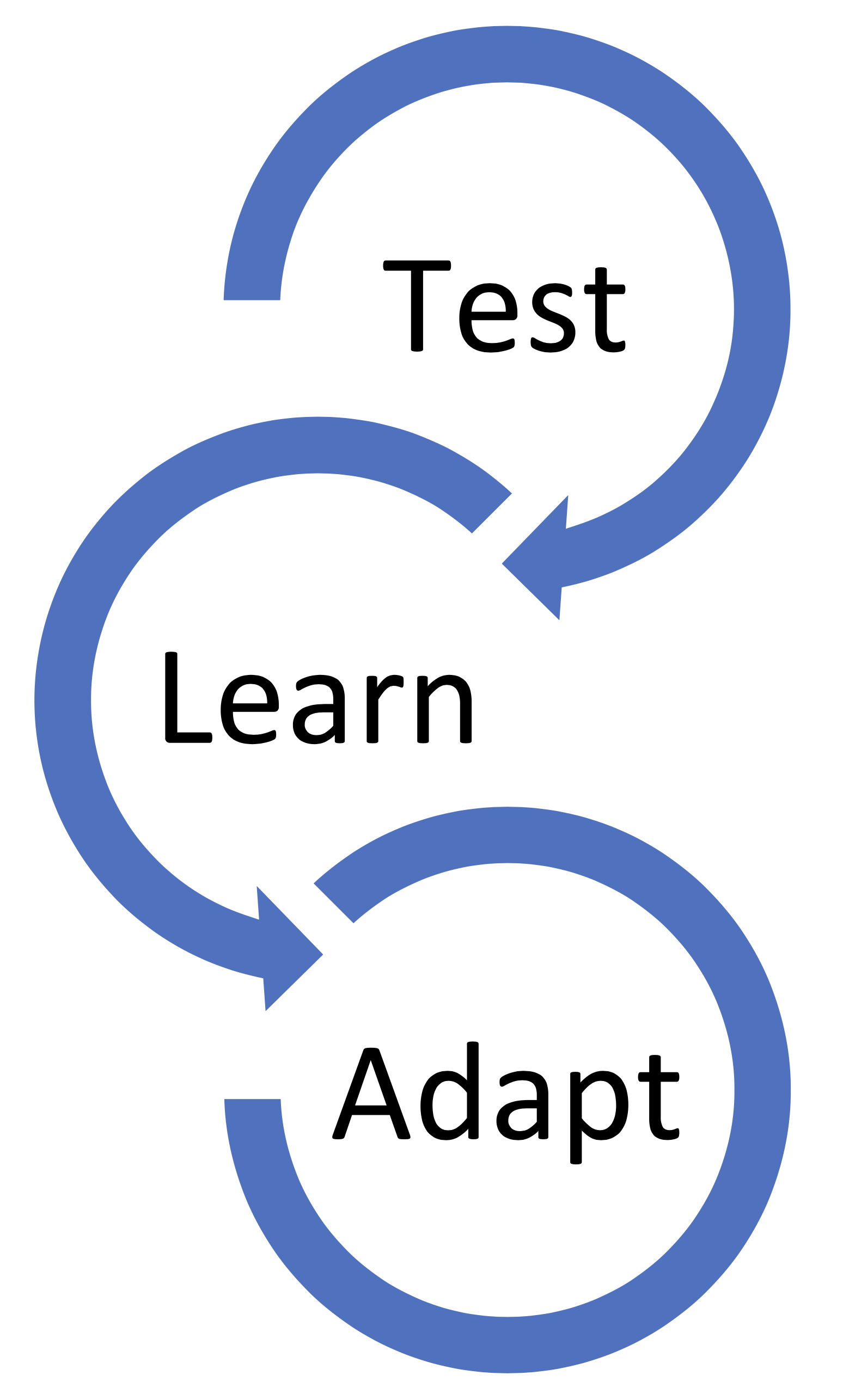
A year as successful as 2020 brings a great deal of fulfillment and celebration. And it comes with learning. The Foundation approached the year with a Test / Learn / Adapt model to rapidly test answers to questions encountered by “start-ups” through experimentation and more quickly inform decisions. We put in place: an organizational structure; a grantmaking process; decision making roles and defined and launched programmes. We tested these elements and we learned.
In 2021 we will adapt, grow, and change based on our 2020 learnings to implement our strategy in support of our annual objectives.
Our 2021 Objectives
The Foundation will build on our success of 2020 and:
- Commit up to $7M in funding to high quality, independently reviewed and scored applications through existing and new programme funding areas by:
-
- Simplifying the grant application process
- Implementing quality controls, providing grantee networking activities and a streamlined and robust M&E process
- Encouraging applications from organizations that are working to unlock the Internet’s potential to tackle the world’s evolving challenges.
- Increase awareness of the opportunities provided by the Foundation among potential grantees and other key audiences by implementing a comprehensive communications campaign that includes: storytelling; publishing research findings; and sharing case studies.
- Establish a community of grantees by providing opportunities for communication, collaboration and learning among organizations funded by the Foundation.
- Launch two new programme funding areas, assuming the appropriate resources are available:
- The second component of RARE (explained below as a programme to prepare select countries to respond to future emergencies)
- BOLT(explained below as a programme to support previously awarded grantees and create a laboratory of discovery, learning and sharing to spark innovative ideas).
Our 2021 Programme and Funding Areas Strategy
The Foundation is committed to continuing and/or launching the following five programme areas to shape our portfolio in 2021:
- Beyond the Net – Internet Society Chapters and SIGs funding will continue with some modifications to the Small and Large programmes to further streamline process.
- SCILLS (Strengthening Communities / Improving Lives and Livelihoods – formerly known as Capacity Building) will continue to aim to expand economic growth, improve health outcomes and increase educational opportunities by supporting individuals and communities to more knowledgeably and skillfully use the Internet.
- Research – will continue to support global collaborations for research that is applied and open, meaning research that seeks to answer a real-world question and that is openly published and made available to the scientific community at no cost.
- BOLT (Building Opportunities & Leveraging Technology – formerly known as Innovation) – is defined below and will be launched in 2021.
- RARE (Resiliency and Responding to Emergencies – formerly known as Disaster) – the first component, Emergency Response, was launched in 2020 and we plan to launch component two, Resiliency, in 2021.
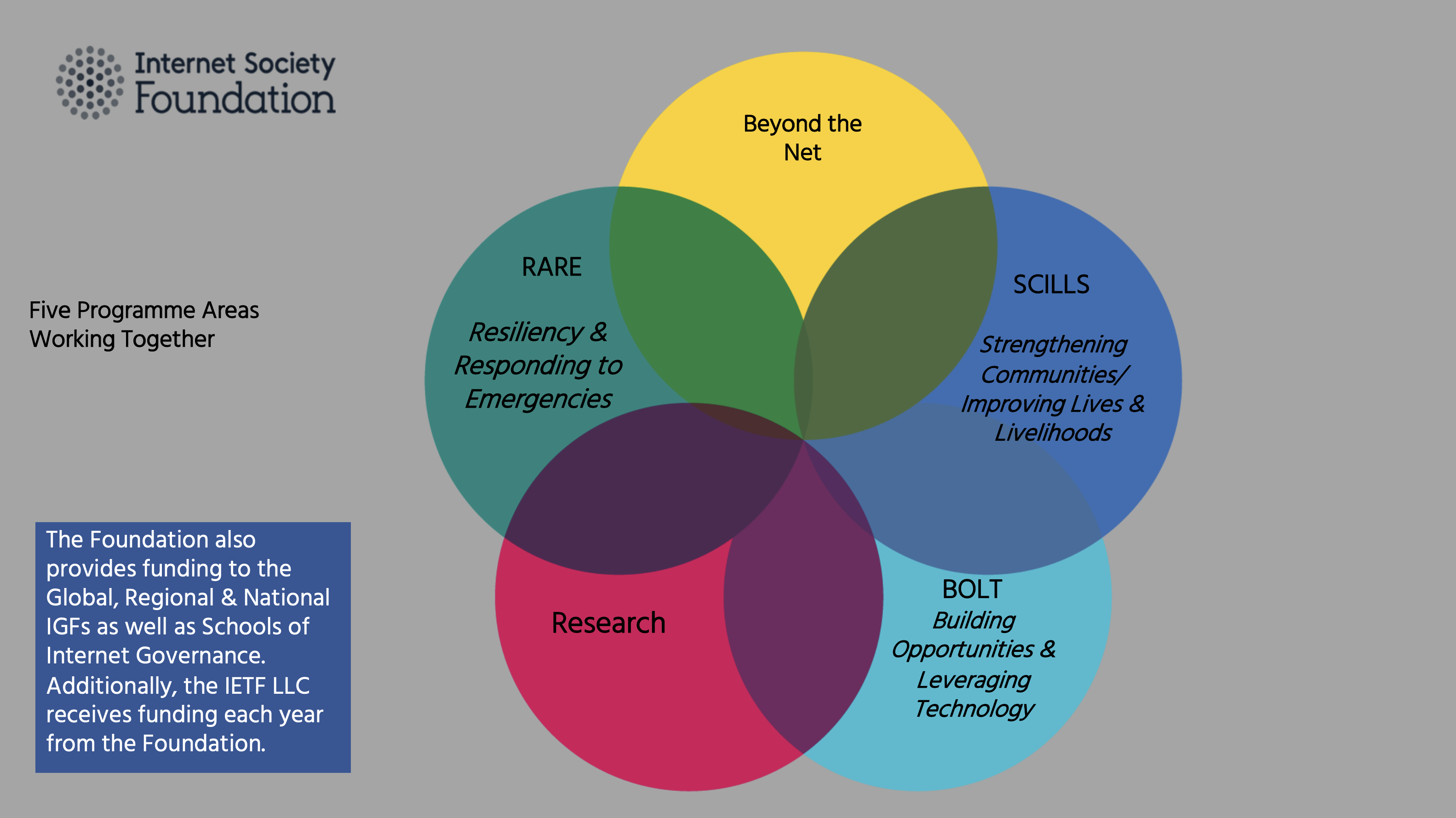
1. Beyond the Net
To better tailor the Beyond the Net (BtN) programme to the needs of the Chapters/SIGs, while endeavoring to streamline staff workload, the following changes were undertaken in the end of 2020 and will continue in 2021:
- BtN will no longer have funding cycles and instead be run on a continuous basis allowing Chapters/SIGs to apply when they are ready.
- Following an analysis of the applications received in 2020, the focus areas for BtN are being revised to focus on the areas of greatest interest to Chapters/SIGs. These are: establishing or facilitating connectivity; growing local Internet-related knowledge and skills; understanding Internet usage and local needs; and promoting innovation.
- Chapters/SIGs will no longer be eligible to apply for further grants if they have not submitted all required reporting for their current grants.
- Unless there are exceptional circumstances, projects will only be extended by a maximum of three months for Small grants and eight months for Large grants.
In 2021, the team will also build ways to recognize and celebrate the Chapters/SIGs’ successful work. This might include a new form of communication about successful projects or we may also consider establishing a recognition programme.
2. SCILLS – Strengthening Communities / Improving Lives & Livelihoods
In 2021, the SCILLS programme will continue to run as it has in 2020 with a continued focus on Bangladesh, Colombia and Senegal. A second cycle focused on these three countries will be opened in late spring 2021. Given that the 2020 grantees will have just started to implement their projects, we believe that regional expansion should only begin in 2022 in order to provide sufficient opportunity to develop lessons learned and a methodology around this programming that can inform the expansion plan.
In addition to building a methodology for this programme, 2021 will focus on building a “cohort” of grantees who can share lessons learned and challenges across regions.
3. Research
In 2021, the Research Programme will operate largely as it did in 2020, but there will be two additional thematic areas. In addition to Greening the Internet and the Internet Economy, we will make grants related to themes The Digital Divide and A Trustworthy Internet. The aim is to support at least six research projects spread across the four thematic areas by the end of 2021.
4. BOLT - Building Opportunities & Leveraging Technology
Formerly known as Innovation, the programme in 2021 will center on our two Program Officers identifying projects awarded in 2020 that are demonstrating successes and that should thus be considered for innovative expansion. Work will also be done to establish pipelines and funding streams aligned with incubators and/or venture firms to facilitate further development of projects beyond the BOLT programme once Foundation funding has ended. This could lead to the projects’ commercialization or inclusion in the industry as a best practice.
5. RARE - Resiliency & Responding to Emergencies
Formerly known as the Disaster programme, RARE is comprised of two complementary components.
Component One: Assuming appropriate resources are available, RARE Programme’s “Resiliency” component will officially launch in Q3 2021 and will focus on disaster preparedness and building Internet resiliency in communities more vulnerable to disasters. We will look at countries most vulnerable to natural disasters with significant Internet penetration and use as well as those with an active Internet Society presence. The countries listed below were recommended by the Bridgespan consultants, but this list may be revised later:
- Asia: Bangladesh, Philippines, Japan
- Central America: Guatemala, Nicaragua, Costa Rica, El Salvador
- Africa: The Gambia, Mauritius
Component Two: To respond to future emergencies, in conjunction with the Executive Director, the Program Officer will work to define “emergency” for 2021 and will shape a set of criteria that will be used to respond to the defined emergency as the Foundation did with COVID-19 in 2020.
IGF and Schools of Internet Governance / Sponsorships
In 2021, the Foundation will continue to fund the Global Internet Governance Forum (IGF), Regional IGFs and Schools of Internet Governance. Local and national IGFs and Schools of Internet Governance will continue to be funded through the BtN Small programme.
IETF LLC
The Foundation will continue to provide funding of the IETF LLC operational costs as it has since 2019. This funding supports and strengthens the IETF’s robust open Internet standards process and improves reliability, performance and ease of use of IETF tools & platforms.
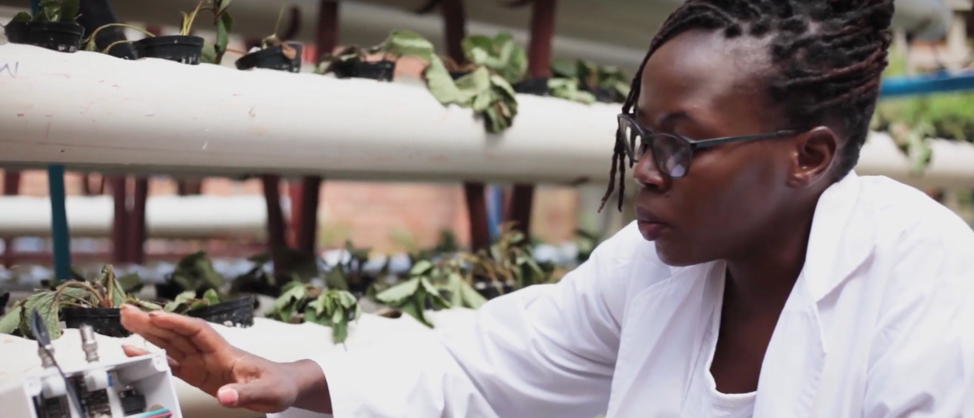
Our Operations & Organizational Capacity
Operations and Organizational Capacity include those elements required for the Foundation to successfully solicit, review, award and manage grants as well building the team and developing training curriculum for applications and grantees. It also incorporates increasing visibility of our work.
Communications
The Foundation’s 2021 communications strategy continues our efforts to increase understanding and visibility of our work with key stakeholders and demonstrate the positive impact our grants have on communities around the world. Based on our 2020 Test / Learn / Adapt model, we have identified five important components that will be central to our strategy going forward:
- Articulating our brand and identity: The Foundation was established with a broad mandate to further the reach of the Internet Society’s work. We now see a need to further articulate the Foundation to our diverse stakeholders a brand and identity that is distinct from, while complementary to, that of Internet Society.
- Eliminating misunderstanding within the Internet Society Community: Although we have been actively working to educate the Internet Society Community, we believe we need to be more aggressive with a targeted communications programme that better articulates the role of the Foundation, our relationship to grantees, and how we differ from Internet Society.
- Building a cohesive grantee community: In partnership with the programmes team, we will provide regular opportunities for our grantees to connect with each other and the Foundation, network, and develop their own capabilities.
- Demonstrating transparency and accountability: Clear communication will continue to be critical in demonstrating transparency and accountability to our stakeholders and ensuring that our programmes and processes are easily understood by and accessible to our grantees. Tools to employ include our website, data collected from grantees, and full engagement of the Programme Officers. Their unique 1:1 relationship with grantees helps in clarifying information, building trust, and setting the underpinning for a strong and equitable grantee/grantor relationship in which both parties are committed to transparency and accountability.
- Communicating our Impact: As we enter 2021, it is important for the Foundation to evaluate and communicate both the impact of our programming, and our overall impact as a Foundation. Some areas we may consider as operational Key Performance Indicators (KPIs) for the Foundation include: number of grantees funded and reporting on their own KPIs; grantee satisfaction rate; and growth in Foundation’s advocates. Once these KPIs are in place, we will build a holistic communications strategy that uses tools such as storytelling on our website, published research findings, annual reports, and case studies to communicate our impact.
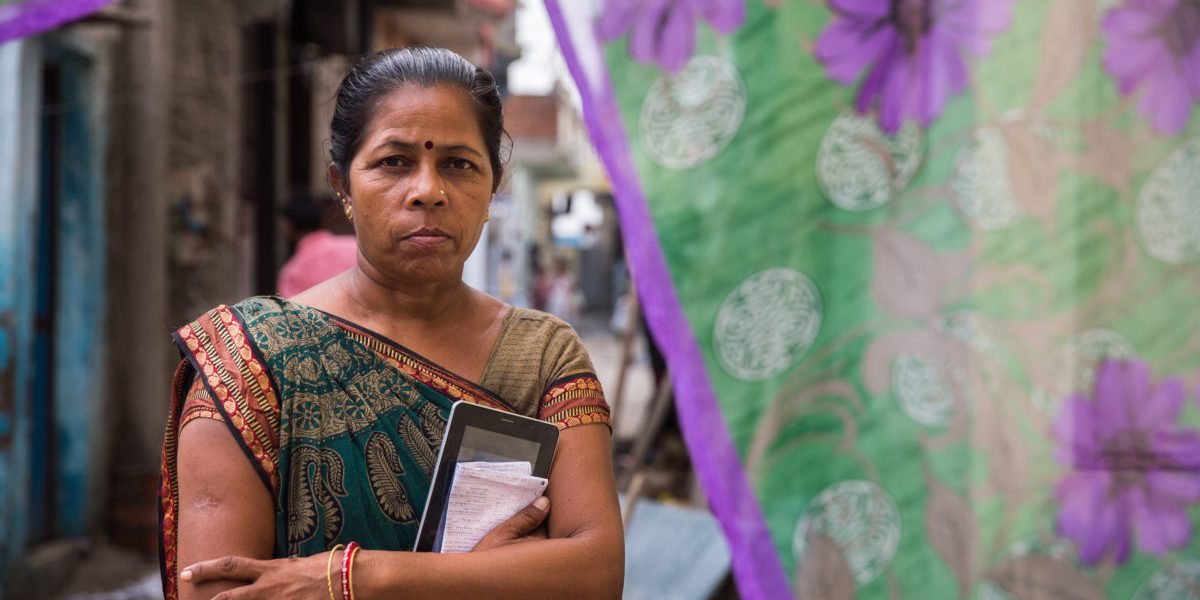
Communicating and Modeling Transparency and Accountability
The early days of establishing the Foundation came with a strong emphasis on the importance of being transparent and accountable.
As outlined above, we established a solid foundation of transparency and accountability through communications. We frequently shared information via our website, social media channels and public relations as well as in dialogues at conferences and via video-conferencing with those interested in working with the Foundation. We established and shared clear eligibility guidelines and selection criteria as well as the processes used to review and score grant applications.
We will continue to do all of this and more in 2021 to demonstrate our commitment to transparency and accountability. But that is just one part of the strategy.
Part two of a transparency and accountability strategy comes in the form of how applications are reviewed and scored. In 2020, an Independent Review Panel (IRP) was recruited to review, score and then recommend which pre-screened applications should be considered for funding and at what funding level.
Once more, in 2020, the Foundation tested, learned and now must adapt. We remain unconditionally committed to engaging objective individuals to review and score applications, but the model must be simplified, and the members more complementary with the projects we are being asked to fund.
Therefore, rather than having a large structured pool of independent panelists with whom we laboriously work with to try to make the right assignments, we will instead have several Independent Programme Review Committees (IPRC) composed of independent reviewers better matched to our programme funding areas. Members of IPRCs may be referred or recommended by the larger Internet community and industry insiders or sought out by the Foundation’s Program Officers for their unique expertise.
By establishing IPRCs, we can better tie expertise to grant applications for reviewing and scoring.
Our Team
The Foundation’s organizational chart is shown below. There will be a staff of ten full time employees and continued support from the Internet Society’s legal, human resources, information technology and finance teams. The Foundation’s Executive Director will maintain the reporting relationship to the Foundation’s CEO as well as the Foundation’s Board of Trustees.
The staff is organized into two integrated pillars: Programmes on the left and Operations on the right.
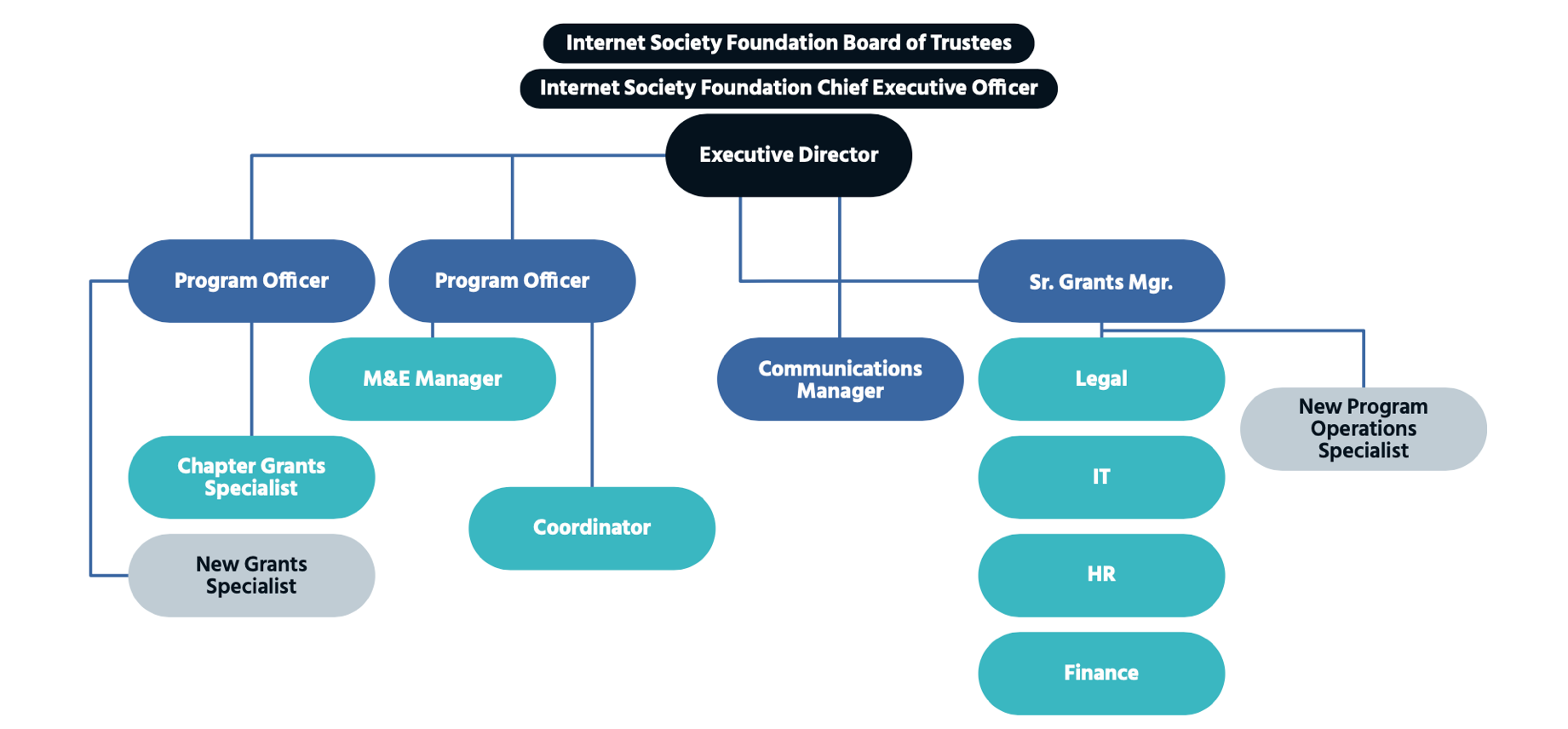
Technology
The Grants Management System, Fluxx, was launched in March 2020 and has proven to be an excellent, user friendly system for managing grants. It will support all new programme areas in 2021 while also providing the same structure and functionality required to manage ongoing grants awarded in 2020, and previous years (BtN grants transferred from the Internet Society). The system was initially configured with a focus on scale and our ability to functionally support the Foundation during a time of growth and adaptation.
The Foundation has the necessary resources to have a backup for System Administration as well as to meet all System Administration demands. In 2021, these resources will also be integral to configuring, beta testing, and eventually deploying Fluxx’s new, immersive multi-lingual experience for grantees and applicants. In effect, a user can choose their language of preference (ES, FR, or EN) and fully interact with the system in that language, without the need for separate datasets in the backend. This will effectively place us at the leading edge of the final deployment and offering our applicants and grantees a richer user experience.
Applicant & Grantee Training
In early 2020, the Foundation created the “Grant Application and Project Implementation Guidance”, a guide of different training resources aiming to provide all the Foundation applicants and grantees with the tools to successfully design, implement, measure and communicate the impact of their projects.
The Grant Application and Project Implementation Guidance was designed with the assistance of an external Monitoring, Evaluation and Learning (MEL) company, based on feedback from past challenges faced by BtN and the commitment of the Foundation to help each future applicant and grantee.
In 2021, we will offer all of these modules in a more accessible format for both high and low bandwidth environments. The Foundation has engaged a firm to make the training more interactive and more user-friendly to increase usage of the models and thus the benefits to our applicants and grantees.
Measuring Our Success
Success in 2021 for the Foundation means achieving the objectives set forth in this Action Plan. We will be:
- Committing up to $7M in funds to high impact and innovative projects through the BtN Small and Large, SCILLS and Research programmes as well as RARE and BOLT.
- Increasing awareness of the opportunities provided by the Foundation among potential grantees and other key audiences through our communications. The Foundation will track and report on the number and reach of tactics including: articles published and viewed on the website; participation in external events; and social media efforts.
- Seeing grantees utilizing the community and network created by the Foundation to: explore opportunities for collaboration; move work outside of individual organizational silos; and potentially combine resources to support big ideas that provide meaningful access to an open, globally connected, secure and trusted Internet for everyone.
- Supporting high quality applicants and grantees of the Innovation/BOLT programme and Component Two of the RARE programmes by the Foundation. This will be completed by providing targeted co-creation support for select applicants (BOLT) and developing a set criteria and definition of emergencies respectively (RARE). This is dependent on having the appropriate resources available.
- Compiling best practices and lessons learned from the current Component One of RARE grants (Emergency Response: COVID-19) including documenting new connections and ways of working created by our grantees through our funding.
Additionally, the Foundation will continue to stay focused on maintaining a healthy ratio of administrative costs to programme funding. We are comfortable with the numbers shown in the budget section below after researching the administrative costs and grantmaking ratios of foundations similar to ours. Likewise, we are investing in a higher percentage of administrative costs in these initial start-up years so that we may continue to grow and further our impact.
Budget
The Foundation 2021 operating budget includes the annual contribution from Public Interest Registry (PIR) of $24.1 million (less our annual contribution to the Internet Engineering Task Force (IETF) of $6.250 million; other personnel and operating costs; as well as Board Designated Funds to support our programme awards. All costs in the budget support the growth, reach and impact of the Foundation.
